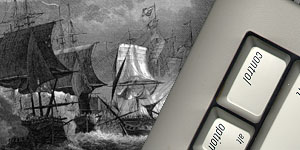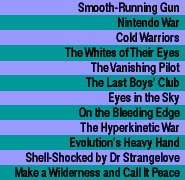


Make a Wilderness and Call It Peace
Yes, makin' mock o' uniforms that guard you while you sleepIn western countries, because of the glitz and gosh-wow of high-technol- ogy megadeath seen in the Gulf War, television audiences saw war without pain, war without guilt, and war without noticeable victims. Not having heard the screams of the burned, crushed, suffocated, and bombed, many now find it fashionable to pray for war. That will pass, because other nations saw the same battles from the same vantage---CNN. And they'll certainly want the new weapons for themselves. They too see the value of more precise, more capable, more effective weapons.
Is cheaper than them uniforms, and they're starvation cheap.
Rudyard Kipling, Tommy
The gross disparity in training, weaponry, and surveillance displayed during the Gulf War will lead to what every major advance in war technology has always led to---victor overconfidence. But as all sides race to develop more competent and complex weapons, and as computer costs continue to halve every two years, the balance of terror on the battlefield will once again even out. War, even for the victors, will once again become what it's been for ages immemorial---hell on earth.
War is a crystal ball we can use to examine our future and our past. In war, we learn what we're really like and, sometimes, what we would like to be. The crystal has often shown us that we're bloody-minded, uncaring, and selfish. It has also shown us hope, and love, and self-sacrifice on a scale we rarely see in normal times.
The new crystal in war today is made of silicon. Born in a baptism of blood during the Second World War, that crystal is giving us glimpses of our future path through the onrushing millennium. It shows us that we will give over more and yet more of what we value most to the control of smarter and yet smarter machines. The sheer speed and volume of information we must master today is simply too great for us to keep our fingers on all the triggers. We're losing control.
But our future isn't without its pluses. It's true that we often first use a new technology as a weapon. It takes hours to build a good sandcastle, but only seconds to demolish it; decades to grow a tree, but minutes to chop it down. However, it's also but a step from war robots to home robots. Because of today's wars, we can be sure that tomorrow's machines will be far smarter than their dumb cousins are today.
When we hear about future computer applications, they're usually something pretty banal, like talking word processors or smart televisions. Which is only natural since most of us think of a computer as a sort of glorified typewriter. Next to video games and cash machines, after all, word processors are probably the single most common use of computers we see. But if you really want an idea of what computers could become, don't think of typewriters, think of cruise missiles.
Despite how advanced our machines get, however, we'll still need soldiers, even if many of them will eventually be made of silicon. Many civilians today look down on the warriors we ask to fight our wars. It's always been true that when soldiers do their job, when they stand between their loved homes and war's desolation---keeping it far away, few in deaths, and small in costs---that's when we most shun them.
Nobody knows what the future will be. Those who tell you they do are either lying, misguided, or selling something. Petroleum-eating bacteria could evolve tomorrow and eat all the world's oil, making all forecasts irrelevant. The future is always more peculiarly strange than any of our tidy imaginings. But one thing seems sure. We'll always need soldiers. The Cold War is over, Adam Smith outran Karl Marx, but there will be other wars. There always are.